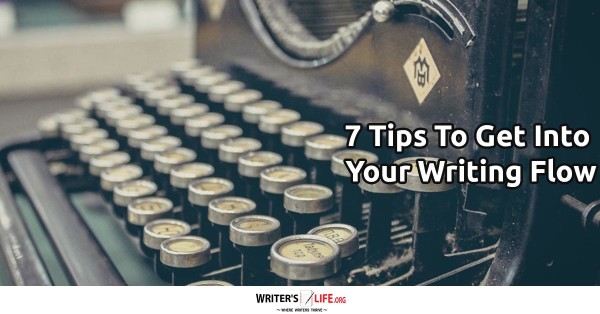- How To Tackle Jealousy In Creative Writing
- Common Submission Mistakes
- How To Stop Your Blog Becoming Boring
- The One Thing Every Successful Writer Has In Common
- How To Make Yourself Aware Of Publishing Scams
- Why Almost ALL Writers Make These Grammar Mistakes At Some Point
- 5 Tips For Authors On How To Deal With Rejection
- Top Mistakes to Avoid When Writing a Novel
- How to Avoid Common New Writer Mistakes
- 10 Mistakes New Fiction Writers Make
7 Tips To Get Into Your Writing Flow

One of the most annoying things about trying to sit down and write is when you just can’t seem to get into the ‘zone.’
You switch off your phone, turn off your email, make sure no one is going to bother you, and yet, every time you start writing, a few seconds later, you simply seem to run out of steam.
This whole stop-start-stop-start process rarely leads to your best writing, and it can feel frustrating, laborious and pretty pointless too!
If, after an hour or so of struggling to get something down on paper, you’ve barely moved on, you can start to despair - and it's no wonder!
The good news is that you are not alone - lots of writers find it difficult to get into their writing flow, and feel anxious lost and unproductive when they can’t seem to get anything out.
When you do get into your writing zone, however, it feels amazing!
The words just seem to flow out of you, you barely have time to think yet your fingers know exactly what to type next - and when you are done, not only have you written loads, but it's also pretty darn good (even if you do say so yourself)!
So how can you make your writing sessions more like this and less staring zombie-like at a computer screen for hours while an increasing sense of self-loathing creeps up on you?
Well luckily, there are things you can do to make it so! Here are some of them:
Get into a routine
Write at the same time every single day. This might be a process of trial and error at first, but if you can figure out when you are at your most creatively productive you'll make the most of your writing time.
Don’t let anything else stand in your way, and even when you feel you haven’t got anything to say, just keep practising your craft.
Sticking to a strict writing routine will help to prompt your brain to get into the creative mindset at the same time each day, and therefore it will be easier to get into your writing flow.
Find your perfect space
Spacious, tranquil, light and uncluttered spaces work best. If you work in an environment surrounded by mess, you can’t help but get distracted by it.
A clear workspace will have a positive effect on your wellbeing and de-clutter your mind too which will leave more room for the creative juices to flow!
Listen to music
Music can be powerfully inspiring, emotive and all in all, pretty wonderful.
Next time you feel like you have nothing to write about, or get stuck at a certain point in your story, why not try listening to some music to see if that can help?
Pick the music to fit the mood - if your character is just about to get into a fight, choose some angry music, if they are about to have a romantic liaison choose something soft and light.
Find silence
Some writers, myself included, find it very hard to write when there is too much noise around them (I had to say goodbye to my dream of spending my days sitting and writing in chic coffee shops pretty early on).
If you get distracted by noise, why not try writing super early in the morning or really late at night? You never know, you could find a whole lot of inspiration in those silent hours.
Free write
Sometimes you just need to loosen up a bit to get into your writing flow. So next time you sit down for a writing session, spend the first five minutes free writing - that’s just writing anything that comes into your head - it doesn’t even have to make sense.
The purpose of free writing is to help writers get rid of blocks such as the inner critic and writing apathy.
Read over your previous work
Don’t just try and dive right back into your story, give yourself a chance to get into it first. Read over the last chapter or two before you start writing to help you get back into the plot.
Always end before you want to
If you stop before you want to, you’ll be excited about returning to your work for the next session. If you keep writing until you run out of steam, you’ll feel the opposite. Stopping short is a great way to keep your writing flow alive, and you’ll be able to carry easily carry on when you next get to it.
These are just some of the tried and tested techniques writers use to get into their writing flow, do let us know yours!






























